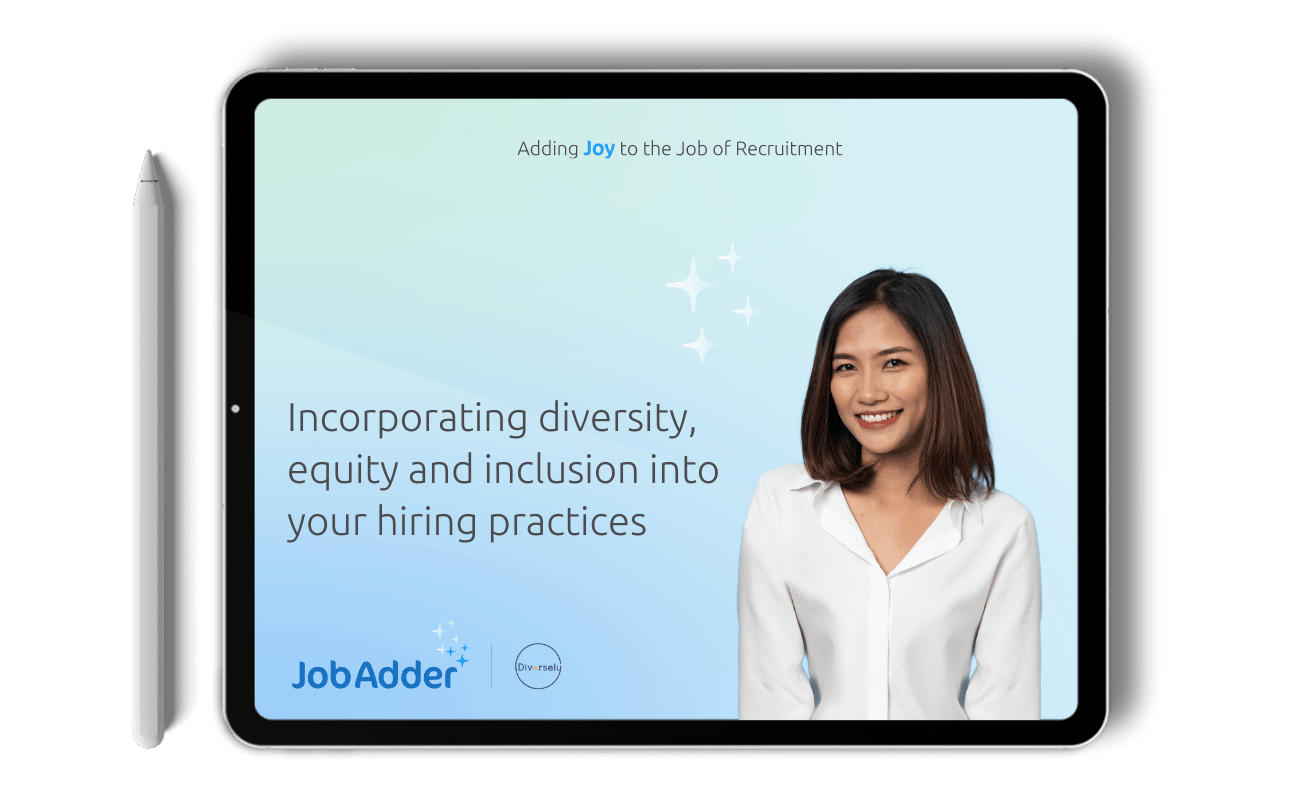Recruitment Blog
Diversity in the workplace: Why it matters and how to increase inclusion

Diversity, equity and inclusion must form the foundations of any business today. Around the world, people are learning more about unconscious bias, discrimination, inequality and systemic problems.
While many companies talk about valuing diversity, some are still struggling to make that dream a reality. For recruiters and HR departments, a key priority should be figuring out how to promote equality, diversity and inclusion in the workplace. But how do we do it?
In this article, we’ll lay out the key considerations around diversity, equity and inclusion and then discuss how you can effectively incorporate them into your workplace policies.
FREE DOWNLOAD: Incorporating diversity, equity and inclusion into your hiring practices
What is diversity in the workplace?
Workplace diversity means that a company employs people who represent a wide range of different characteristics, perspectives and experiences.
By focusing on improving diversity, your workplace will become more inclusive of people with differences in gender, age, race, ethnicity, physical ability, sexual orientation, cultural background and other characteristics.
And guess what? This diversity of perspectives and experiences will make your company stronger, more cohesive and better at what you do.
But diversity alone isn’t enough to accomplish that goal.
Diversity, equity and inclusion
Imagine you have a very diverse workplace, with people from all different walks of life, experience, race, gender, sexual orientation, etc. But then imagine that the only people who make decisions at the company are white and male.
It’s probably not hard to imagine because this is still the case in many organisations. The problem is that organisations may be hiring a more diverse workforce, but they aren’t changing anything in their policies around equity and inclusion.
What does this mean? Let’s define our terms.
- Diversity: Diversity is simply the presence of differences within a group.
- Equity: Equity means fair treatment, access and opportunity for everyone. Your identity doesn’t predict or affect your outcomes. Equity also means eliminating barriers that have historically existed for specific groups or identity types.
- Inclusion: Inclusion means inviting people of diverse backgrounds into every part of your processes. A diverse variety of people have power, authority and a voice in decisions.
- Diversity is having many voices in the room.
- Equity is ensuring no voice is always louder than all others.
- Inclusion is considering all voices in decision making.
To achieve meaningful results, companies must promote diversity, equity and inclusion in the workplace.
Why diversity matters
Think about it. No two people are alike, and we each bring our life experiences with us to work. In a diverse workplace, people have more resources and perspectives to solve problems and overcome challenges.
Without diversity, organizations can have substantial blind spots.
For example, in the past decade, makeup companies began listening to diverse voices and making various colours for various skin tones. Since those brands began adjusting to include more skin tones, they have opened up a whole new customer base. New brands like Fenty, which made US$72 million in its first month, grew out of this need as well.
Studies have shown that workplace diversity can increase productivity, retention, culture and even your bottom line. Below are just a few benefits from prioritising diversity, equity and inclusion.
Diverse teams make more money
A study from MIT found that more diverse workplaces ultimately improved a company’s bottom line. Homogenous teams – where everyone was very similar – felt like they were doing better because there was more explicit agreement. But diverse groups, though the process felt more complex, ultimately outperformed their less diverse competitors.
Diverse teams are more innovative
Diverse experiences lead to diverse perspectives. If you are trying to solve a problem and you get stuck, you need someone with a different perspective to come along and help. Consider these facts:
- Harvard Business Review found that not only does diversity improve innovation, but an inclusive environment encourages every employee to live up to their full innovative potential.
- Companies with higher diversity, equity and inclusion produced 46% of their revenue from innovation, while companies with lower diversity only produced 26% from innovation.
Diverse teams better understand customers
In our increasingly global world, diverse teams are more likely to reflect the society around them. This reflection of reality enables companies to remain agile and responsive to changing trends.
Diversity, equity and inclusion also help companies understand their clients better. One study found that in a team where at least one member shared a client’s identity, the team is more than twice as likely to meet that client’s needs.
Diverse teams have better culture and retention
Employee turnover happens most often when employees don’t feel that they belong or don’t feel safe.
- More than 40% of employee turnover happens within their first month of employment.
- An additional 10% of turnover occurs within the first year.
Inclusion is a vital part of company culture and retaining talented employees. Diverse work climates show increased trust and openness in working relationships.
How to increase diversity, equity and inclusion in the workplace
So if diversity, equity and inclusion make such a big difference for companies, how do we ensure we can establish and continuously reinforce them? Just talking about diversity and inclusion can’t make your workplace diverse. Many companies spend a lot of money on diversity programs to find they aren’t getting the outcomes they hoped for.
Let’s explore how HR and recruiting departments can change this vital area of workplace success.
Legal considerations
In many countries, various laws protect historically excluded groups and protect rights in the workplace. For example, you can’t legally ask prospective employees about their family planning or their age. You also can’t fire an employee just for getting pregnant.
- In the US, the Equal Employment Opportunity Commission (EEOC) regulates these laws.
- Canada’s Human Rights Act codifies protections for diversity within a workplace. The Canadian Human Rights Commission oversees these laws and protections, and specific legislation addresses equal pay issues.
- The UK’s Equality and Human Rights Commission functions similarly to Canada’s and works to ensure employees receive protection under the Equality Act.
- Different countries within the EU all have their version of these equality legislations and human rights laws. As a centralised authority, the EU has established non-discrimination directives for its members and supports disenfranchised employees.
These laws are in place to protect companies as well as employees. They help set a process for employers to follow to be sure you aren’t inadvertently discriminating against someone based on a blind spot or unconscious bias. While we all want to have a better, more inclusive workplace, sometimes it’s hard to see where we might be getting in our way.
How HR and recruiters can get involved
HR departments need to be deeply familiar with the legislation in their state and region. You may also want to consult a lawyer before making any hiring and firing decisions.
Beyond legal requirements, HR departments and recruiters can significantly impact their company’s diversity, equity and inclusion. Here are a few key areas to consider.
Reduce bias in hiring
Explore practical ways to reduce bias in your hiring process. You can accomplish this through blind resume reviews, gender-neutral job ads and descriptions, work tests and standardised interviews.
Monitor and look for areas to improve
Implement employee surveys and external audits to test your organisation against global trends, and ensure you are hitting your goals for diversity.
You need to ensure your executives and board are brought into the process as well. Keep them involved throughout the process and focus on results.
Some organisations find that Diversity Committees help keep goals on track. If you decide to put this together, consider compensating employees for their time on the committee and ensure you are not leaning exclusively on BIPOC in your office to provide this counsel.
Widen your talent pool through diverse recruitment
Consider your main pipelines of recruitment. Often jobs are found through business and college networks. Unfortunately, if these networks have been historically white, they aren’t going to change overnight. Look up diverse organisations and networks to help supply talent.
Focus on mentoring
Mentoring is one of the key ways people advance through an organisation. Often, whether it’s due to overt or unconscious bias, people only mentor others who are similar to them. That’s where an HR department or recruiter can come in. You can help set up mentoring relationships based on strategic growth for employees.
Mentoring outperformed other tactics in increasing diversity, with mentoring increasing minority representation in management roles by nine to 24 per cent.
The future is bright
With a more diverse workforce, the global future promises to be brighter, more inclusive and innovative. Companies need to focus on bringing in more diverse employees and creating inclusive and equitable environments for advancement and growth.
As recruiters and decision makers, you have a crucial role to play in helping to promote diversity, equity and inclusion in the workplace.
Want to improve diversity in your recruitment? Access our free eBook with Diversely now.

Related blog posts

AI has quickly gone from something relatively unknown to a fully integrated part of most recruitment agencies’ operations. According to …
Ready to get started?
Talk to one of our friendly team members


